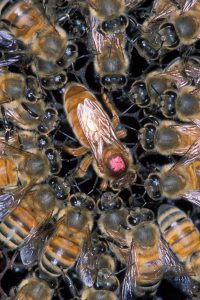Honey bees may inherit altruistic behavior from their mothers

Scott Bauer, USDA Agricultural Research Service
By Katie Bohn
UNIVERSITY PARK, Pa. — True altruism is rare behavior in animals, but a new study by Penn State researchers has found that honey bees display this trait. Additionally, they found that an evolutionary battle of genetics may determine the parent they inherit it from.
For the study, published in the journal Molecular Ecology, the researchers examined the genetics behind “retinue” behavior in worker honey bees, who are always female. After the worker bees are exposed to the queen bee’s pheromone, they deactivate their own ovaries, help spread the pheromone to the other worker bees, and tend to the queen and the eggs she produces.
This behavior is considered altruistic because it ultimately benefits the ability of the queen to produce offspring, while the worker bee remains sterile. For honey bees, the queen is typically the mother of all, or nearly all, the bees in the hive.
The researchers found that the genes that make worker bees more receptive to this pheromone — and therefore more likely to display the retinue behavior — can be passed down from either the mother or father bees. However, the genes only result in altruistic behavior when they are passed down from the mother.
Sean Bresnahan, corresponding author, doctoral candidate in the Intercollege Graduate Degree Program in Molecular, Cellular, and Integrative Biosciences and a National Science Foundation Graduate Research Fellow, said that in addition to giving insight into bee behavior, the findings also show that which parent a bee inherits certain genes from can affect how those genes are expressed, something that is notoriously difficult to study in insects.
“People often think about different phenotypes being the result of differences in gene sequences or the environment,” he said. “But what this study shows is it’s not just differences in the gene itself — it’s which parent the gene is inherited from. By the very nature of the insect getting the gene from its mom, regardless of what the gene sequence is, it’s possibly going to behave differently than the copy of the gene from the dad.”
Christina Grozinger, co-author and Publius Vergilius Maro Professor of Entomology at Penn State, said the study also supports the Kinship Theory of Intragenomic Conflict — a theory that suggests the mothers’ and fathers’ genes are in conflict over what behaviors to support and not support.
She said that while previous work has shown that genes from males can support selfish behavior in mammals, plants and honey bees, the current study is the first to show that genes from females can pass altruistic behavior onto their offspring.
“Honey bees are one of the few animal species that display altruistic behavior, where some individuals give up their own reproduction to help others,” Grozinger said. “This study reveals a very subtle and unexpected form of genetic control of those behaviors. With our system, we see that genes from the mother — the queen — are supporting altruistic behavior in her offspring, which leads to more copies of her genes in the population. Instead of producing their own eggs, the worker bees support the queen’s reproduction. This complements our previous studies, which showed that the fathers’ genes support selfish behavior in worker bees, where the bees will stop helping their queen mother and focus on their own reproduction.”
The queen mates with multiple males, so worker bees have the same mother but different fathers. Breshnahan explained that this means they share more of their mother’s genes with each other.
“This is why the Kinship Theory of Intragenomic Conflict predicts that genes inherited from the mother will support altruistic behavior in honey bees,” Breshnahan said. “A worker bee benefits more from helping, rather than competing with, her mother and sisters — who carry more copies of the worker’s genes than she could ever reproduce on her own. In contrast, in species where the female mates only once, it is instead the father’s genes that are predicted to support altruistic behavior.”
To read the complete article go to: Honey bees may inherit altruistic behavior from their mothers | Penn State University (psu.edu)
We are here to share current happenings in the bee industry. Bee Culture gathers and shares articles published by outside sources. For more information about this specific article, please visit the original publish source: Honey bees may inherit altruistic behavior from their mothers | Penn State University (psu.edu)






